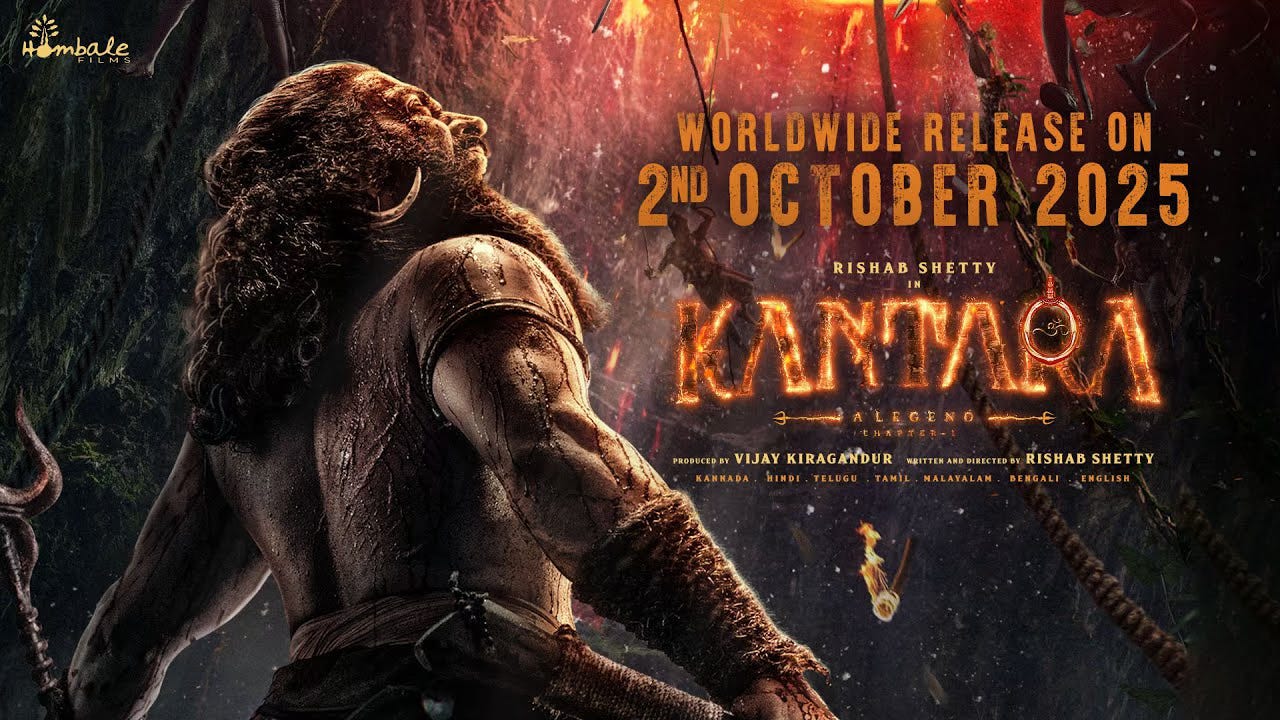
By Rishab Shetty’s vision, the forest Rishab Shetty’s Kantara – Chapter 1 returns to the mystical land that mesmerised audiences in 2022, yet this time the narrative roots dig deeper into the soil of faith, power, and ancestry. While Kantara explored the fragile balance between man and nature in the modern era, Chapter 1 transports us centuries back to uncover the origins of that legend — the first spark of divine rage and devotion that shaped the destiny of the land.
Set in the early ages when kingdoms and tribes contested for spiritual supremacy, the story unfolds around a powerful deity and a warrior bound by fate. Rishab Shetty, who both directs and stars once again, brings a raw, almost primal intensity to his portrayal. His performance resonates with spiritual energy — more a ritual than mere acting. The world he creates feels untouched by time: thick forests cloaked in mist, drums echoing like heartbeat, and rituals rendered with breathtaking authenticity.
Visually, the film is extraordinary. Cinematographer Arvind S. Kashyap paints the screen with earthy grandeur — fire-lit ceremonies, monsoon-drenched forests, and a visual rhythm that mirrors the pulse of the folklore. The background score, by B. Ajaneesh Loknath, is haunting; it doesn’t accompany the visuals, it possesses them. The beats of the Daiva Kolaritual throb through the film like ancient memory made sound.
The screenplay is slower and more meditative than the first film, and deliberately so. It trades quick thrills for mythic depth, exploring how belief can both unite and divide, how fear of the divine can become power, and how every legend begins in blood and sacrifice. This is not a sequel built for spectacle alone; it is a spiritual prelude that lays the philosophical foundation for the world of Kantara.
Some may find its pacing uneven, and the narrative occasionally indulgent in its grandeur, yet that is part of its spell. Kantara – Chapter 1 is not merely a film to watch; it is an experience to feel — a cinematic invocation of earth, spirit, and ancestry.
In an era of formulaic storytelling, Rishab Shetty reminds us that cinema can still be a prayer.speaks again — louder, deeper, and more divine.
Tamil
திரைப்பட விமர்சனம்: காந்தாரா – அத்தியாயம் 1
“காடு மீண்டும் பேசுகிறது — இம்முறை, அது தெய்வத்தின் குரலில்.”
ரிஷப் ஷெட்டியின் காந்தாரா – அத்தியாயம் 1 நம்மை மீண்டும் அந்த மர்மமிகு காட்டின் மடியில் அழைத்து செல்கிறது. 2022ல் வெளிவந்த காந்தாரா மனிதன் மற்றும் இயற்கையின் உறவினை நவீன காலத்தில் சித்தரித்திருந்தால், இம்முறை கதை பல நூற்றாண்டுகளுக்கு முன் சென்று அந்த புராணத்தின் பிறப்பை வெளிப்படுத்துகிறது — தெய்வத்தின் கோபமும், பக்தியின் வேர்களும் எப்படி பூமியை வடிவமைத்தன என்பதைக் கூறுகிறது.
கதை நடக்கும் காலம் அரசுகளும் பழங்குடிகளும் தெய்வீக ஆட்சிக்காக போராடிய பண்டைய யுகம். அதில் ஒரு வீரனும் ஒரு தெய்வமும் இணைந்த விதி மையமாகிறது. இயக்குநராகவும், நடிகராகவும் ரிஷப் ஷெட்டி மீண்டும் அதே ஆழத்துடன் தோன்றுகிறார். அவரது நடிப்பு ஒரு சாதாரண வெளிப்பாடு அல்ல — அது ஒரு வழிபாடு போல தோன்றுகிறது. காடுகளின் குரல், புல்வெளியின் வாசனை, மழையின் மிருதங்கம் — அனைத்தும் திரையில் உயிருடன் நம்மைச் சுற்றி நிற்கின்றன.
ஒளிப்பதிவாளர் அரவிந்த் எஸ். காஷ்யப் அளித்த காட்சிகள் கண்ணை கவரும் கலைப்பாடுகள். தீப்பொறி நிறைந்த யாகங்கள், மழையால் நனையும் காடு, நிழலும் ஒளியும் ஒன்றாக கலக்கும் இயற்கை — ஒவ்வொரு ஃப்ரேமும் ஓர் ஓவியம் போல உணர்த்துகிறது. பி. அஜனீஷ் லோக்நாத் இசைத்த பின்னணி இசை, திரைப்படத்தின் இதயத் துடிப்பாக திகழ்கிறது; குறிப்பாக தெய்வகோலா சடங்கின் தாளங்கள் திரையில் ஆழ்ந்த தெய்வீக உணர்வை கிளறுகின்றன.
திரைக்கதை முந்தைய பாகத்தை விட மெதுவாக நகர்கிறது, ஆனால் அது நோக்கமுடையது. சண்டை அல்லது திரைப்பயமல்ல, நம்பிக்கையின் வேர்கள், ஆட்சியின் ஆசைகள், மற்றும் தியாகத்தின் விலை பற்றிய சிந்தனையை இதுவே மையமாக்குகிறது. ஒவ்வொரு புராணமும் இரத்தத்திலும் தியாகத்திலும் பிறக்கிறது என்பதை இது நினைவூட்டுகிறது.
சிலருக்கு படத்தின் ஓட்டம் மெதுவாகவோ, காட்சிகள் நீண்டதாகவோ தோன்றலாம். ஆனாலும் அதுவே அதன் மாயம். காந்தாரா – அத்தியாயம் 1 ஒரு திரைப்படம் மட்டுமல்ல; அது ஒரு அனுபவம் — பூமியின் வாசம், ஆன்மாவின் சப்தம், முன்னோர்களின் நினைவு.
சினிமா ஒரு பிரார்த்தனை ஆக முடியும் என்பதை ரிஷப் ஷெட்டி மீண்டும் நிரூபித்துள்ளார்.






